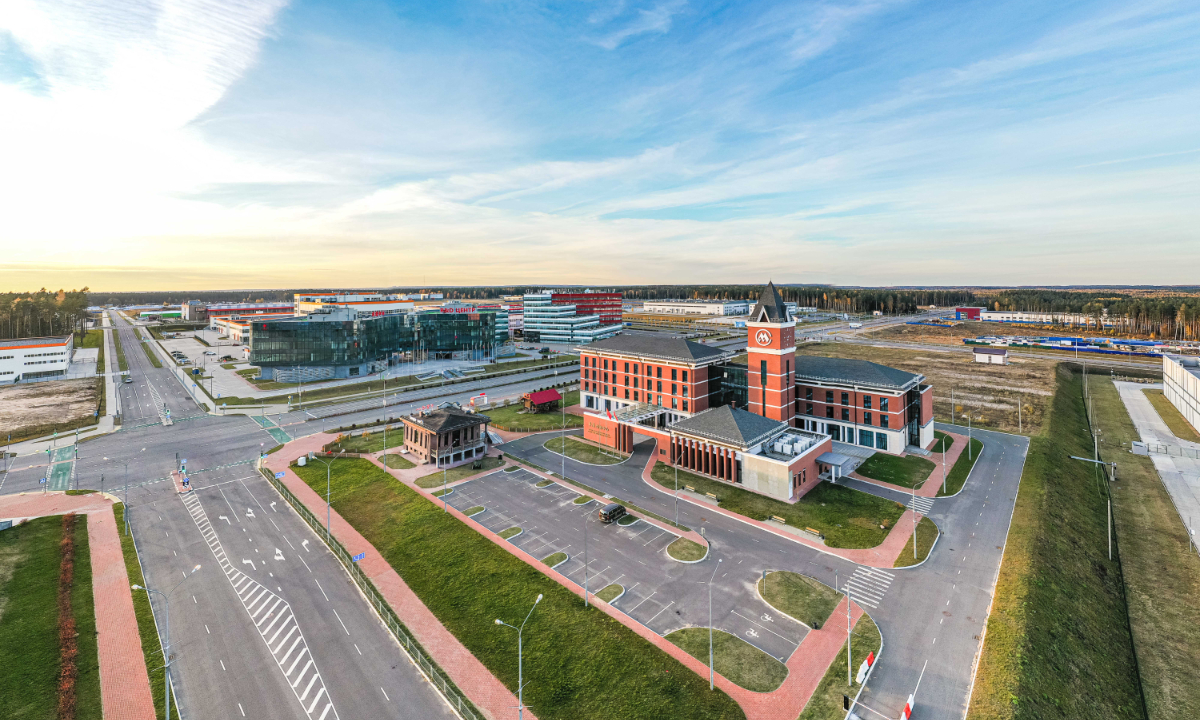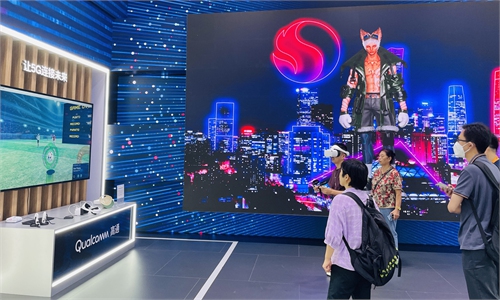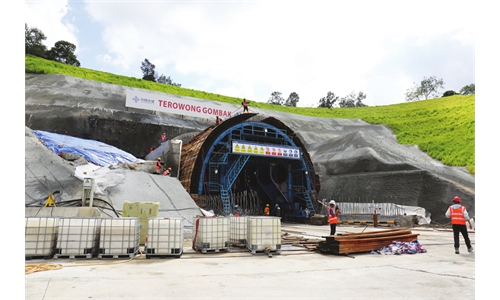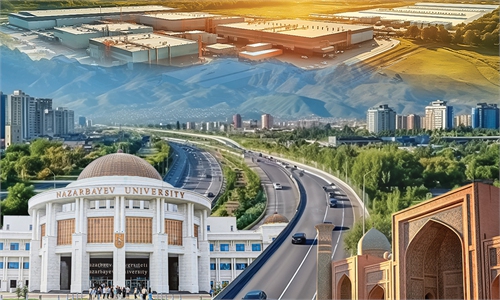IN-DEPTH / IN-DEPTH
From 'piece of white paper' to 'shining new city': China-Belarus Industrial Park keeps thriving despite geopolitical shock

An overhead view of the China-Belarus Industrial Park Photo: Xinhua
A giant engraved "Great Stone" stands at the entrance of the China-Belarus Industrial Park in Minsk, capital of Belarus. Advertisements for "Great Stone" can also be seen on highways linking the city center to the park. The name "Great Stone" was given by Belarus President Alexander Lukashenko to the park as it embodies "the cornerstone of the friendship between the peoples of China and Belarus." Nobody could ever have imagined the forest would one day turn into a shining pearl of the Belt and Road Initiative.
From a "piece of white paper" to "a shining new city," what has made the industrial park what it is today? What difficulties did the park weather to keep thriving amid today's complicated geopolitical atmosphere? Reporters from the Global Times entered the largest foreign investment project in Belarus to find out the secret of its prosperity.
Miraculous development
At the entrance of the park, there's a giant display board that says "time is money, efficiency is life" in both Chinese and Russian. In Belarus, local people, amazed by the speed of construction of the industrial park, developed an idiom that says, "You will never step into the same China-Belarus Industrial Park."
The park is located near the center of Belarus and sits on transport links within easy reach of the Moscow-Berlin international highway to Russia and Central Europe. The Belarus government set up a customs office inside of the park, to speed up customs clearance and provide quick service for commerce, bonded warehouse storage and others.
Foundation of the park was laid in 2014. Since the second half of 2015, the China-Belarus Industrial Park has developed rapidly. Developed within the framework of the China-proposed Belt and Road Initiative (BRI), the park has witnessed rapid expansion.
In an exclusive interview with the Xinhua News Agency earlier this year, Lukashenko noted it is the largest project attracting investment in Belarus and a landmark cooperation project within the BRI framework as it was promoted by the two heads of state personally and prized by the two governments.
As of August, a total of 114 enterprises had settled in the China-Belarus Industrial Park, involving various fields such as machinery manufacturing, e-commerce, new materials, traditional Chinese medicine, artificial intelligence and 5G network development. Intended investment exceeds $1.3 billion.
If there's any secret behind the park's rapid development, it is the high-quality coordination between China and Belarus, as well as support from leaders from both countries, head of the park's administration Alexander Yaroshenko told the Global Times.
Yaroshenko once served as deputy minister of the Ministry of Economy of Belarus and was appointed as head of the park's administration in 2016.
"When President Lukashenko handed me this job, he told me, 'We have a bunch of deputy ministers, but we have only one China-Belarus Industrial Park, so your job as head of the park's administration is very important.' So you can see how much importance he attached to the industrial park and his high expectations," said Yaroshenko.
Rapid development of the park also mirrored the elevation of bilateral ties. According to statistics, the bilateral trade volume between China and Belarus in 2022 reached $5.08 billion, setting a new record. On a diplomatic level, the two countries established an all-weather comprehensive strategic partnership in 2022.
Special appeal
Enterprise in the park come from 16 countries. Apart from China and Belarus, there are companies from the US, EU, Switzerland and Singapore, Yaroshenko, standing in front of a world map, introduced to the Global Times reporters. "Our industrial park is very international."
One of Yaroshenko's favorite stories when it comes to attracting investment goes like this. "Six years ago, owners of a US company came to the industrial park by private jet. Said he wanted to see the park with his own eyes. Later he told me he made a huge mistake, for he bought too little land in the park. 'I should have bought land twice as big here!'"
Apart from the advanced infrastructure, the park's considerate policy services are also what makes it so appealing to companies. The park has a "one-stop" efficient service system for enterprises. All approvals involving enterprises are completed in the park, providing full-process services such as investment negotiation, company registration, project access and land transfer.
"In the one-stop service hall, companies can complete all procedures within one or two hours. Yet in other places, it may take seven hours to a month," Deputy Director General of the Industrial Park Development Company Ren Fei told the Global Times. The one-stop service hall is a lesson learned from China's Suzhou Industrial Park. Moreover, companies who settle in the China-Belarus Industrial Park can enjoy preferential policies on visas, customs clearance and taxes.
The Belarusian company Human Craft, which manufactures medical prostheses, settled in the park at the end of 2022. Anton Naczyński, general manager of the company, told the Global Times that the reason the company chose this park is because the park's management helps every company develop and expand into the overseas market. He hopes that within such an environment, his company and Belarus' medical prostheses can reach the world's advanced level.
New Silicon Valley
However, the park has encountered challenges from COVID-19 and the Russia-Ukraine crisis in recent years. Yet Ren brushed off the impact of those events on its development.
"In 2017, there were 10 companies in the park. Since 2018, the number of companies settled in the park stayed at 18 to 20 annually. Despite the impact of COVID-19, 20 new companies chose our park in 2021, and the number in 2022 was 19," said Ren. He expects a record 23 or 24 new companies will be landing in the park this year.
The reason for such growth is the park's timely adjusting of measures to weather the impact of geopolitical shock and Western countries' sanctions. Ren said since the Russia-Ukraine crisis, the park has adjusted the source structure for attracting investment.
"Previously, many enterprises that came here were oriented toward the European and US markets. Now, the focus is mainly on the Eurasian Economic Union market, as well as investments from member countries of the Shanghai Cooperation Organization," said Ren.
Meanwhile, when facing sanctions from the West, several banks in Belarus have also received assistance from the park in accessing the Chinese yuan payment system. This has helped resolve many payment difficulties for enterprises through bilateral currency settlements, said Ren.
He also told the Global Times that they are intensifying efforts to address transportation issues through the China-Europe Railway Express, partially offsetting the impact of disrupted maritime shipping in Belarus following the Russia-Ukraine crisis.
In the eyes of many, the park is not only an industrial park, it is also an "intelligence new city" that is endowed with a beautiful and pleasant environment.
In the medium to long term, the park aims to attract more than 100,000 industrial population and become an international comprehensive development zone.
Shymanovich Aliaksandr, an employee from the China National Machinery Industry Corporation (Sinomach)'s Belarus branch, told the Global Times that the park is full of happiness because there are many green trees here, and one can breathe the freshest air at any time. The production space, living space, and natural space are also all well integrated.
Alexey Kliuchnikov, chief of the R&D department of YTO Technology, a leading agricultural machinery supplier in China that also opened an office in the industrial park, said that working in the company not only offers a significantly higher income compared to the average level in Minsk, but also provides many opportunities to exchange ideas with Chinese counterparts and learn the latest technologies.
"Our goal is to make this place a 'new Silicon Valley in Central and Eastern Europe,'" Ren said proudly. In his eyes, the park is not just a project, but a manifestation of the passion and ideals of a group of people.




